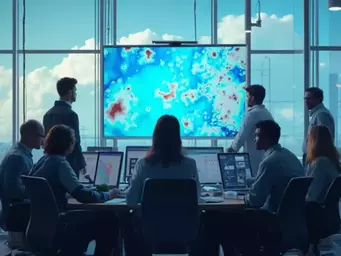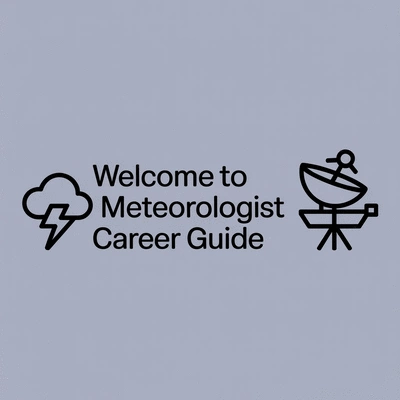Consider the last time you sought shelter from a sudden downpour or prepared for an impending storm. As the impacts of climate change loom larger, the role of meteorologists becomes increasingly vital. This article unveils the multifaceted path to a career in meteorology, emphasizing how you can make a difference while pursuing your passion for weather science.
What You Will Learn
- Meteorologists significantly contribute to disaster preparedness and response, enhancing community safety.
- Climate research conducted by meteorologists plays a crucial role in addressing global warming challenges.
- A Bachelor of Science in meteorology or atmospheric science is essential for starting a career in this field.
- Pursuing advanced degrees can open doors to specialized roles in climate modeling and severe weather prediction.
- Networking at meteorology events and engaging with industry professionals can provide valuable insights and opportunities.
- Skills in data analysis, communication, and technology are vital for success in the evolving field of meteorology.
- Hands-on experience through internships and volunteer work is instrumental in building a strong foundation for your career.
- Getting involved in public outreach enhances public understanding of weather phenomena and climate issues.
Meteorology Career Path: Key Transition Steps & Benefits
This visual outlines the educational pathways, skill enhancement opportunities, and the societal impact of a career in meteorology.
Educational Pathways
- • Bachelor's (B.S.) in Meteorology/Atmospheric Science
- • Master's (M.S.) & Ph.D. for advanced roles
- • Accredited programs with practical application
Skill Enhancement
- • Certifications (CBM, NWA Seal)
- • Online courses (data analytics, GIS, Python)
- • Internships & volunteer opportunities
Key Motivations
- • Impact on Society & Disaster Preparedness
- • Contribution to Environmental Awareness
- • Personal Fulfillment & Career Variety
Career Changers
- • Leverage existing skills (engineering, data analysis)
- • Create personalized transition plans
- • Network with industry professionals
Understanding the Path to a Meteorology Career
Have you ever looked up at the sky and wondered what it takes to understand the weather? The field of meteorology is not just about predicting rain or shine; it’s about making a significant impact on society and addressing pressing environmental concerns. As a meteorologist, you have the chance to contribute to safety and preparedness in your community while enjoying the personal fulfillment that comes from a career in science!
With climate change becoming a global topic of discussion, this career path is more critical than ever. Aspiring meteorologists can work towards solutions that affect us all. Think about it—your work could help farmers optimize their crop yields or assist communities in preparing for severe weather events. The appeal of this career is not just in the science; it’s in the chance to make a real difference!
Why Consider a Career in Meteorology?
- Impact on Society: Meteorologists play a key role in disaster preparedness and response.
- Environmental Awareness: Contributing to climate research can help combat global warming.
- Personal Fulfillment: Engaging in a field that constantly evolves and challenges you intellectually.
- Career Variety: Opportunities in research, education, and public service.
As you reflect on these aspects, consider what excites you most about the possibility of becoming a meteorologist. Is it the science, the outreach, or perhaps the community impact? These motivations can guide your educational and professional journey.
Who Can Transition to Meteorology?
The beauty of meteorology is that it welcomes a diverse range of individuals from various backgrounds. If you're coming from fields like engineering, environmental science, or data analysis, you may already possess the foundational skills needed for a successful transition into meteorology. It's all about leveraging what you already know!
Many career changers find that their previous experiences—such as problem-solving skills from engineering or data interpretation from analysis—translate well into meteorology. This field values those who can think critically and adapt quickly, so if you have these traits, you're already on the right path!
Navigating Educational Requirements for Meteorology
Degree Options: Which Path Should You Choose?
As you embark on this exciting journey, understanding the educational pathways available is crucial. Most meteorologists start with a Bachelor of Science (B.S.) in meteorology or atmospheric science. This degree provides a solid foundation in weather principles, data analysis, and forecasting techniques.
If you're aiming for advanced roles, consider pursuing a Master of Science (M.S.) or even a Ph.D. in the field. These graduate degrees delve deeper into specialized areas such as climate modeling or severe weather prediction. According to the U.S. Bureau of Labor Statistics, a master's degree is often required for research or more specialized scientific positions. Each educational step opens new doors!
Meteorology Degree Programs: What to Look For
- Accreditation: Ensure the program is accredited by a recognized body.
- Course Content: Look for programs that offer a mix of theory and practical application. Rutgers University highlights the importance of a strong science and math background.
- Internship Opportunities: Hands-on experience is invaluable in this field!
- Research Facilities: Access to weather labs and equipment can enhance your learning.
When you evaluate potential programs, consider how they align with your career goals. Do you want a program that focuses heavily on research, or are you looking for one that emphasizes real-world applications? This clarity will guide your decision-making process.
Certifications and Online Courses to Enhance Your Profile
In addition to formal education, pursuing relevant certifications and online courses can significantly bolster your credentials. Programs like the Certified Broadcast Meteorologist (CBM) or the National Weather Association (NWA) Seal of Approval are excellent for those considering roles in media or public outreach.
Online courses in data analytics, GIS technology, or programming languages like Python can also give you a competitive edge. Many platforms offer flexible learning options, allowing you to enhance your skills while managing other responsibilities. Invest in your future—it pays off!
Interactive Poll: Your Meteorology Interest
As you consider a career in meteorology, we’d love to hear from you! What aspect of meteorology excites you the most? Select one of the options below:
Steps for Career Changers: Your Roadmap to Meteorology
Creating a Personalized Transition Plan
Transitioning into a career in meteorology can feel overwhelming, but with a personalized transition plan, it's entirely achievable! Here are some actionable steps to consider as you embark on this exciting journey:
- Skill Mapping: Identify your current skills and experiences that relate to meteorology. Are you good at data analysis? Do you have a knack for technology? These skills are crucial!
- Educational Milestones: Research degree programs or online courses that align with your career goals. Consider starting with a B.S. in meteorology or atmospheric sciences.
- Networking Opportunities: Attend local meteorology events or join online forums to connect with industry professionals. Building a network can offer invaluable insights.
- Practical Experience: Look for internships or volunteer opportunities that provide hands-on experience in weather analysis or data collection.
Reflect on your personal interests as you create this plan. What aspect of meteorology excites you the most? Keeping your passion in mind will help maintain your motivation throughout the process.
Real Stories: Successful Career Transitions to Meteorology
To help inspire you further, let’s explore some real stories of individuals who have successfully transitioned into meteorology. For example, I recently spoke with a former engineer, Mark, who shifted to meteorology after realizing his love for data analysis and weather forecasting. He shared how his engineering background gave him a solid foundation in problem-solving skills that are crucial in weather science.
- Mark's Journey: Mark enrolled in a meteorology program while working part-time at a weather station. He emphasized the importance of gaining practical experience!
- Emily's Path: Emily, a former environmental scientist, found that her knowledge of climate change and environmental data helped her excel in her meteorology studies.
- Jason's Insights: Transitioning from a media career, Jason leveraged his communication skills to explain complex weather concepts, making him a valuable asset in public outreach roles.
Hearing these stories can serve as a reminder that you're not alone in this journey. Many have walked this path before you, and their experiences highlight the diverse backgrounds that can lead to a successful career in meteorology!
Frequently Asked Questions About a Career in Meteorology
- What educational qualifications are required to become a meteorologist?
- Most meteorologists begin with a Bachelor of Science (B.S.) in meteorology or atmospheric science. For advanced roles in research or specialized fields like climate modeling, a Master of Science (M.S.) or Ph.D. is often pursued.
- What are the key benefits of a career in meteorology?
- A career in meteorology offers the chance to significantly impact society through disaster preparedness, contribute to environmental awareness and climate research, and find personal fulfillment in a intellectually challenging and evolving field. There is also a wide variety of career paths within meteorology, including research, education, and public service.
- Can I transition to a meteorology career from a different field?
- Yes, individuals from diverse backgrounds such as engineering, environmental science, or data analysis can successfully transition into meteorology. Existing skills like problem-solving and data interpretation are highly valued and transferable to this field.
- What skills are important for a successful meteorology career?
- Beyond formal education, crucial skills include data analysis, effective communication, and adaptability to new technologies. Certifications like CBM or NWA Seal, and online courses in GIS, Python, or data analytics, can also enhance your profile.
- How can I enhance my career prospects in meteorology?
- Enhance your career prospects by pursuing relevant certifications, taking online courses in specialized areas, gaining hands-on experience through internships or volunteer work, and actively networking with professionals in the field by attending events and joining organizations.
Final Thoughts and Encouragement for Future Meteorologists
Embrace Lifelong Learning and Adaptability
As you embark on your new career path in meteorology, remember that flexibility and a commitment to continuous learning are vital. The field of meteorology is always evolving—whether it's new technologies, methodologies, or climate science advancements. Stay curious!
- Stay Updated: Subscribe to meteorology journals or podcasts to keep informed about the latest trends.
- Participate in Workshops: Attend workshops or webinars offered by meteorological organizations.
- Network Regularly: Make it a habit to connect with fellow meteorologists and share knowledge.
By nurturing a mindset of growth, you’ll be well-prepared to navigate the challenges of this dynamic field. For example, maintaining flight safety often relies on accurate meteorological data, and a recent watchdog report highlighted potential shortages in aviation meteorologists, emphasizing the ongoing need for skilled professionals.
Your Next Steps: Connecting with the Meteorology Community
Building a robust network is crucial in meteorology, and I'm here to guide you! Start by joining organizations like the American Meteorological Society. Memberships often provide access to resources, workshops, and networking opportunities that can propel your career forward.
- Attend Conferences: These gatherings are excellent for meeting professionals and learning from experts.
- Engage on Social Media: Follow meteorology hashtags or communities on platforms like Twitter and LinkedIn.
- Volunteer: Get involved in local weather events or programs to connect with others in the field.
Taking these steps will not only enhance your knowledge but also connect you with mentors who can provide guidance as you navigate your career.
The Role of Public Outreach and Science Communication
In today’s world, engaging with the public and effectively communicating weather-related information is essential—especially given the increasing impacts of climate change. As a future meteorologist, you may find yourself explaining weather phenomena or preparing communities for extreme weather events.
- Public Engagement: Develop skills to communicate complex ideas in simple terms. This can make a significant difference in public understanding.
- Media Interaction: Your ability to work with the media can help convey critical weather information to a broader audience.
- Community Involvement: Participate in outreach programs to educate schools and local communities about weather and climate.
Embracing these opportunities will not only elevate your career but also help foster a more informed public, enhancing the overall impact of meteorology in society. Remember, the world needs passionate meteorologists like you!
Recap of Key Points
Here is a quick recap of the important points discussed in the article:
- Impact on Society: Meteorologists play a crucial role in disaster preparedness and response.
- Educational Pathways: A Bachelor’s degree in meteorology or atmospheric science is typically required, with advanced degrees for specialized roles.
- Skill Development: Essential skills include data analysis, effective communication, and adaptability to new technologies.
- Networking Opportunities: Engage with meteorology organizations and attend events to build professional connections.
- Lifelong Learning: Stay updated with the latest trends in meteorology through journals, workshops, and online courses.









